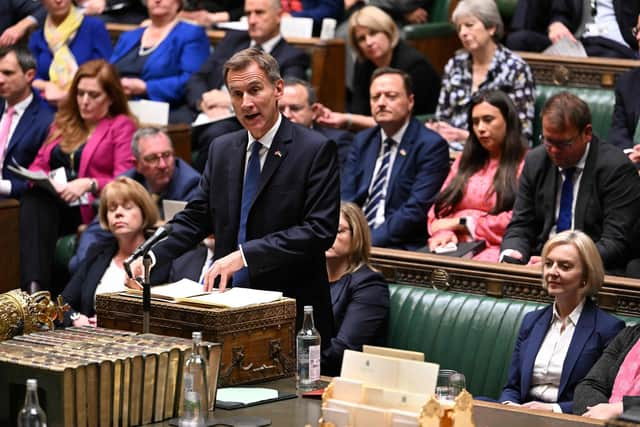Cost of Living: Inflation rises to 40 year high of 10.1% following catastrophic mini-budget
and live on Freeview channel 276
Inflation has risen to a 40 year high of 10.1%, the Office for National Statistics (ONS) has confirmed.
The ONS said that the consumer prices index (CPI) measure was up into double figures or the month of September. . The CPI has risen from an annual rate of 9.9% in August showing the effects of rising costs throughout the country. The rise shows that prices are rising at their fastest rate in 40 years with food costs seeing the biggest increase.
Advertisement
Hide AdAdvertisement
Hide AdThe report expected to show a major increase in grocery costs and there were early reports suggesting that the figures would in fact go back to double digits. However, the report suggested that fuel and transportation elements were tipped to have eased. The data revealed that households and businesses are facing greater uncertainty in their futures after prime minister Liz Truss’ now infamous mini-budget tax.
New Chancellor Jeremy Hunt has 12 days to come up with a plan to gain economic confidence before the medium-term fiscal plan and analysis of the situation from the Office for Budget Responsibility (OBR) on October 31.


What were the official figures from the CPI?
In the year to September food prices were up 14.5%, household services up 20.2%, and goods inflation in total was 13.2%.
However, as predicted petrol prices fell helping limit the rise in overall inflation. In a sign that will concern the Bank of England, core inflation was up 6.5%, from August.
Advertisement
Hide AdAdvertisement
Hide AdInflation was expected to reach more than 15% thanks to the support to households offered to the government. However, the recent change which will see the support ending in April rather than lasting around two years suggests there could be another leap up in spring, depending on what happens to energy prices.
What has Jeremy Hunt said?
Chancellor Jeremy Hunt has responded to the inflation figures, saying the government will prioritise helping the most vulnerable. I understand that families across the country are struggling with rising prices and higher energy bills.”
“This government will prioritise help for the most vulnerable while delivering wider economic stability and driving long-term growth that will help everyone. We have acted decisively to protect households and businesses from significant rises in their energy bills this winter, with the government’s energy price guarantee holding down peak inflation.”


What does this mean for pensions and benefit claimants?
September’s data is of particular importance as it will be used to calculate the rise in state pension and benefits which will come into effect in April.
Advertisement
Hide AdAdvertisement
Hide AdWith information surrounding the government’s spending plan sparse, millions of pensioners and benefit claimants have been left in limbo due to the inflation figures impacting how their payments are uprated.
The figure could have a major impact on the triple lock which means pensions will rise by either average earnings based on the CPI or 2.5%. However, Downing Street has already indicated that ministers could ditch their commitment to the triple lock as the new chancellor finds ways to reduce the nation’s debt.
